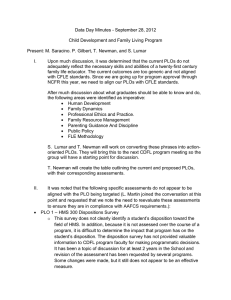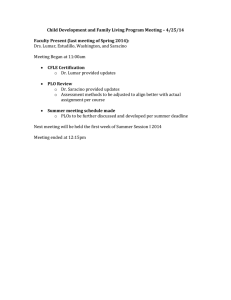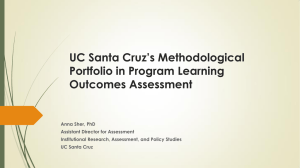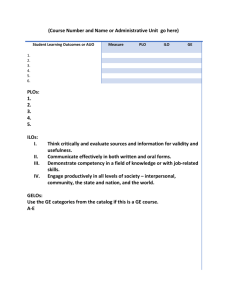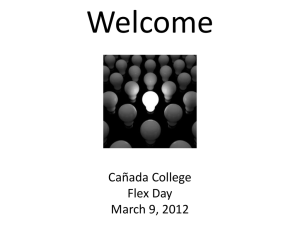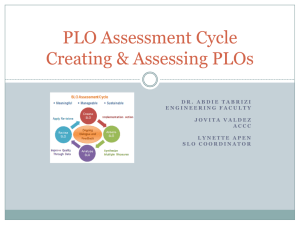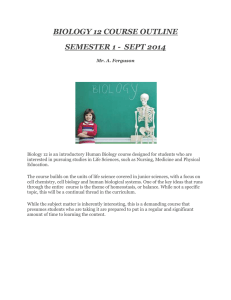Document 10963232
advertisement
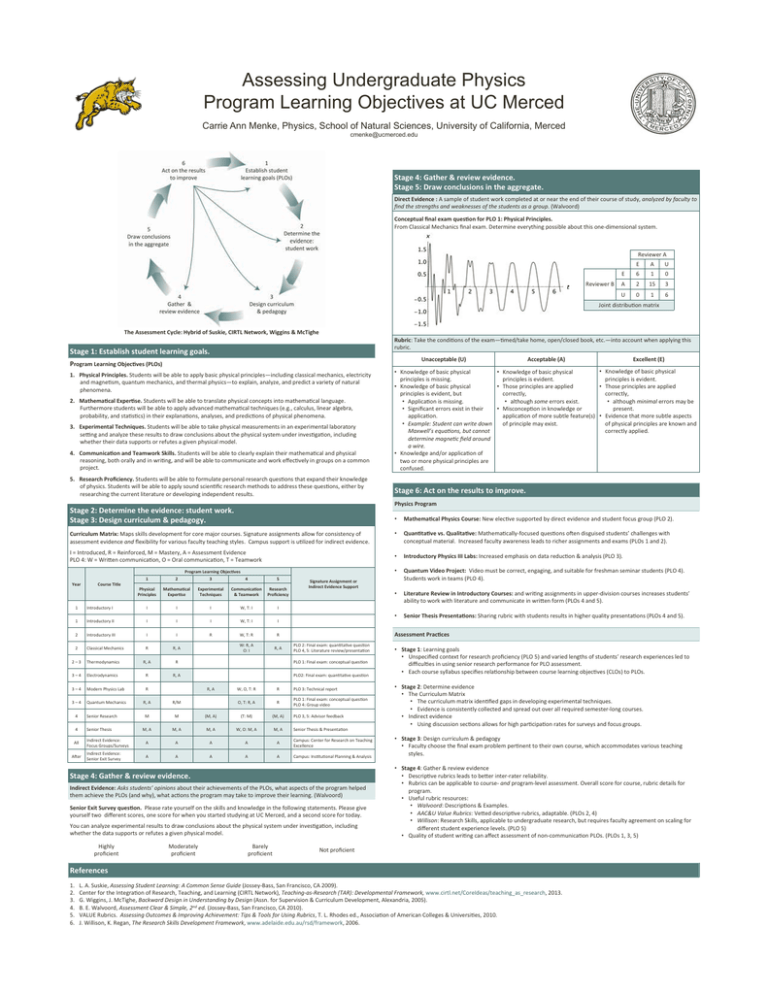
Assessing Undergraduate Physics Program Learning Objectives at UC Merced Carrie Ann Menke, Physics, School of Natural Sciences, University of California, Merced cmenke@ucmerced.edu Stage 4: Gather & review evidence. Stage 5: Draw conclusions in the aggregate. Direct Evidence : A sample of student work completed at or near the end of their course of study, analyzed by faculty to find the strengths and weaknesses of the students as a group. (Walvoord) Conceptual final exam quesGon for PLO 1: Physical Principles. From Classical Mechanics final exam. Determine everything possible about this one-­‐dimensional system. Reviewer A E A U E 6 1 0 Reviewer B A 2 15 3 U 0 1 6 Joint distribu?on matrix The Assessment Cycle: Hybrid of Suskie, CIRTL Network, Wiggins & McTighe Rubric: Take the condi?ons of the exam—?med/take home, open/closed book, etc.—into account when applying this rubric. Stage 1: Establish student learning goals. Unacceptable (U) Program Learning ObjecGves (PLOs) Acceptable (A) Excellent (E) 4. CommunicaGon and Teamwork Skills. Students will be able to clearly explain their mathema?cal and physical reasoning, both orally and in wri?ng, and will be able to communicate and work effec?vely in groups on a common project. • Knowledge of basic physical • Knowledge of basic physical • Knowledge of basic physical principles is evident. principles is evident. principles is missing. • Those principles are applied • Those principles are applied • Knowledge of basic physical correctly, correctly, principles is evident, but • although minimal errors may be • although some errors exist. • Applica?on is missing. present. • Misconcep?on in knowledge or • Significant errors exist in their applica?on of more subtle feature(s) • Evidence that more subtle aspects applica?on. of physical principles are known and • Example: Student can write down of principle may exist. correctly applied. Maxwell’s equaVons, but cannot determine magneVc field around a wire. • Knowledge and/or applica?on of two or more physical principles are confused. 5. Research Proficiency. Students will be able to formulate personal research ques?ons that expand their knowledge of physics. Students will be able to apply sound scien?fic research methods to address these ques?ons, either by researching the current literature or developing independent results. Stage 6: Act on the results to improve. 1. Physical Principles. Students will be able to apply basic physical principles—including classical mechanics, electricity and magne?sm, quantum mechanics, and thermal physics—to explain, analyze, and predict a variety of natural phenomena. 2. MathemaGcal ExperGse. Students will be able to translate physical concepts into mathema?cal language. Furthermore students will be able to apply advanced mathema?cal techniques (e.g., calculus, linear algebra, probability, and sta?s?cs) in their explana?ons, analyses, and predic?ons of physical phenomena. 3. Experimental Techniques. Students will be able to take physical measurements in an experimental laboratory se^ng and analyze these results to draw conclusions about the physical system under inves?ga?on, including whether their data supports or refutes a given physical model. Physics Program Stage 2: Determine the evidence: student work. Stage 3: Design curriculum & pedagogy. Curriculum Matrix: Maps skills development for core major courses. Signature assignments allow for consistency of assessment evidence and flexibility for various faculty teaching styles. Campus support is u?lized for indirect evidence. • • MathemaGcal Physics Course: New elec?ve supported by direct evidence and student focus group (PLO 2). • Introductory Physics III Labs: Increased emphasis on data reduc?on & analysis (PLO 3). • Quantum Video Project: Video must be correct, engaging, and suitable for freshman seminar students (PLO 4). Students work in teams (PLO 4). • Literature Review in Introductory Courses: and wri?ng assignments in upper-­‐division courses increases students’ ability to work with literature and communicate in wriMen form (PLOs 4 and 5). • Senior Thesis PresentaGons: Sharing rubric with students results in higher quality presenta?ons (PLOs 4 and 5). I = Introduced, R = Reinforced, M = Mastery, A = Assessment Evidence PLO 4: W = WriMen communica?on, O = Oral communica?on, T = Teamwork QuanGtaGve vs. QualitaGve: Mathema?cally-­‐focused ques?ons o\en disguised students’ challenges with conceptual material. Increased faculty awareness leads to richer assignments and exams (PLOs 1 and 2). Program Learning ObjecGves Year Course Title 1 2 3 Physical Principles MathemaGcal ExperGse Experimental Techniques I 4 5 CommunicaGon Research & Teamwork Proficiency 1 Introductory I I I 1 Introductory II I I I W, T: I I 2 Introductory III I I R W, T: R R 2 Classical Mechanics R R, A W: R, A O: I R, A 2 – 3 Thermodynamics R, A R 3 – 4 Electrodynamics R R, A 3 – 4 Modern Physics Lab R 3 – 4 Quantum Mechanics R, A 4 Senior Research 4 Senior Thesis All Indirect Evidence: Focus Groups/Surveys Indirect Evidence: A\er Senior Exit Survey W, T: I Signature Assignment or Indirect Evidence Support I Assessment PracGces PLO 2: Final exam: quan?ta?ve ques?on PLO 4, 5: Literature review/presenta?on PLO 1: Final exam: conceptual ques?on PLO2: Final exam: quan?ta?ve ques?on R, A R/M W, O, T: R R PLO 3: Technical report O, T: R, A R PLO 1: Final exam: conceptual ques?on PLO 4: Group video M M (M, A) (T: M) (M, A) M, A M, A M, A W, O: M, A M, A PLO 3, 5: Advisor feedback A A A A A Campus: Center for Research on Teaching Excellence A A A A A Campus: Ins?tu?onal Planning & Analysis Senior Thesis & Presenta?on Stage 4: Gather & review evidence. Indirect Evidence: Asks students’ opinions about their achievements of the PLOs, what aspects of the program helped them achieve the PLOs (and why), what ac?ons the program may take to improve their learning. (Walvoord) Senior Exit Survey quesGon. Please rate yourself on the skills and knowledge in the following statements. Please give yourself two different scores, one score for when you started studying at UC Merced, and a second score for today. You can analyze experimental results to draw conclusions about the physical system under inves?ga?on, including whether the data supports or refutes a given physical model. Highly proficient Moderately proficient Barely proficient • Stage 1: Learning goals • Unspecified context for research proficiency (PLO 5) and varied lengths of students’ research experiences led to difficul?es in using senior research performance for PLO assessment. • Each course syllabus specifies rela?onship between course learning objec?ves (CLOs) to PLOs. • Stage 2: Determine evidence • The Curriculum Matrix • The curriculum matrix iden?fied gaps in developing experimental techniques. • Evidence is consistently collected and spread out over all required semester-­‐long courses. • Indirect evidence • Using discussion sec?ons allows for high par?cipa?on rates for surveys and focus groups. • Stage 3: Design curriculum & pedagogy • Faculty choose the final exam problem per?nent to their own course, which accommodates various teaching styles. • Stage 4: Gather & review evidence • Descrip?ve rubrics leads to beMer inter-­‐rater reliability. • Rubrics can be applicable to course-­‐ and program-­‐level assessment. Overall score for course, rubric details for program. • Useful rubric resources: • Walvoord: Descrip?ons & Examples. • AAC&U Value Rubrics: VeMed descrip?ve rubrics, adaptable. (PLOs 2, 4) • Willison: Research Skills, applicable to undergraduate research, but requires faculty agreement on scaling for different student experience levels. (PLO 5) • Quality of student wri?ng can affect assessment of non-­‐communica?on PLOs. (PLOs 1, 3, 5) Not proficient References 1. 2. 3. 4. 5. 6. L. A. Suskie, Assessing Student Learning: A Common Sense Guide (Jossey-­‐Bass, San Francisco, CA 2009). Center for the Integra?on of Research, Teaching, and Learning (CIRTL Network), Teaching-­‐as-­‐Research (TAR): Developmental Framework, www.cirtl.net/CoreIdeas/teaching_as_research, 2013. G. Wiggins, J. McTighe, Backward Design in Understanding by Design (Assn. for Supervision & Curriculum Development, Alexandria, 2005). B. E. Walvoord, Assessment Clear & Simple, 2nd ed. (Jossey-­‐Bass, San Francisco, CA 2010). VALUE Rubrics. Assessing Outcomes & Improving Achievement: Tips & Tools for Using Rubrics, T. L. Rhodes ed., Associa?on of American Colleges & Universi?es, 2010. J. Willison, K. Regan, The Research Skills Development Framework, www.adelaide.edu.au/rsd/framework, 2006.
